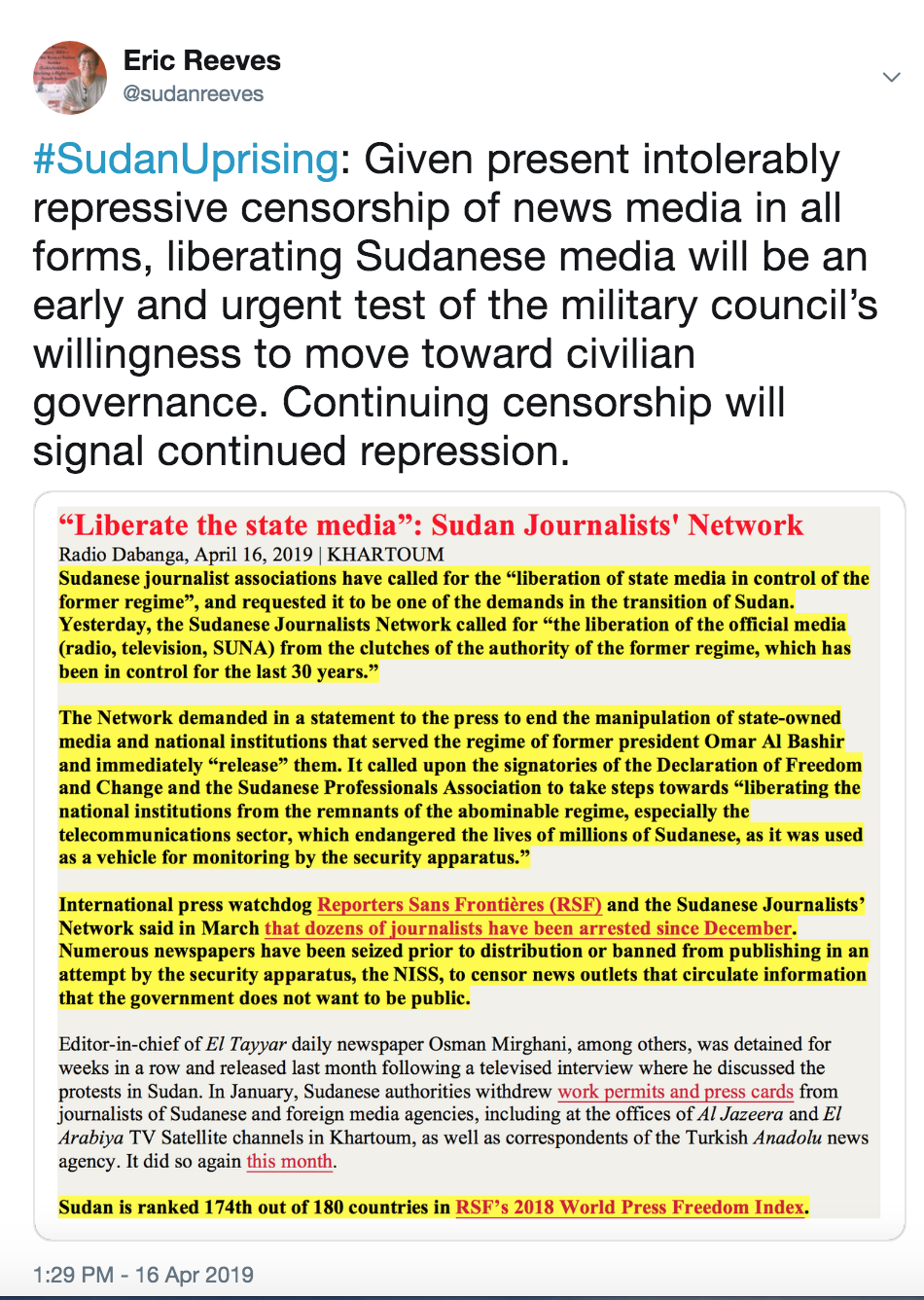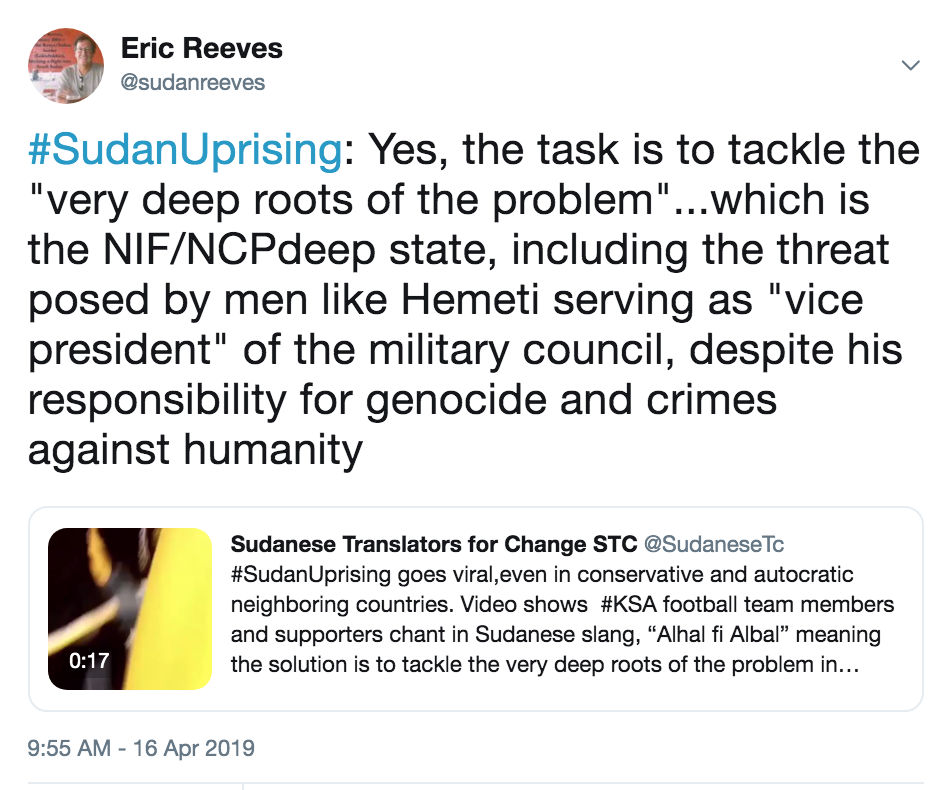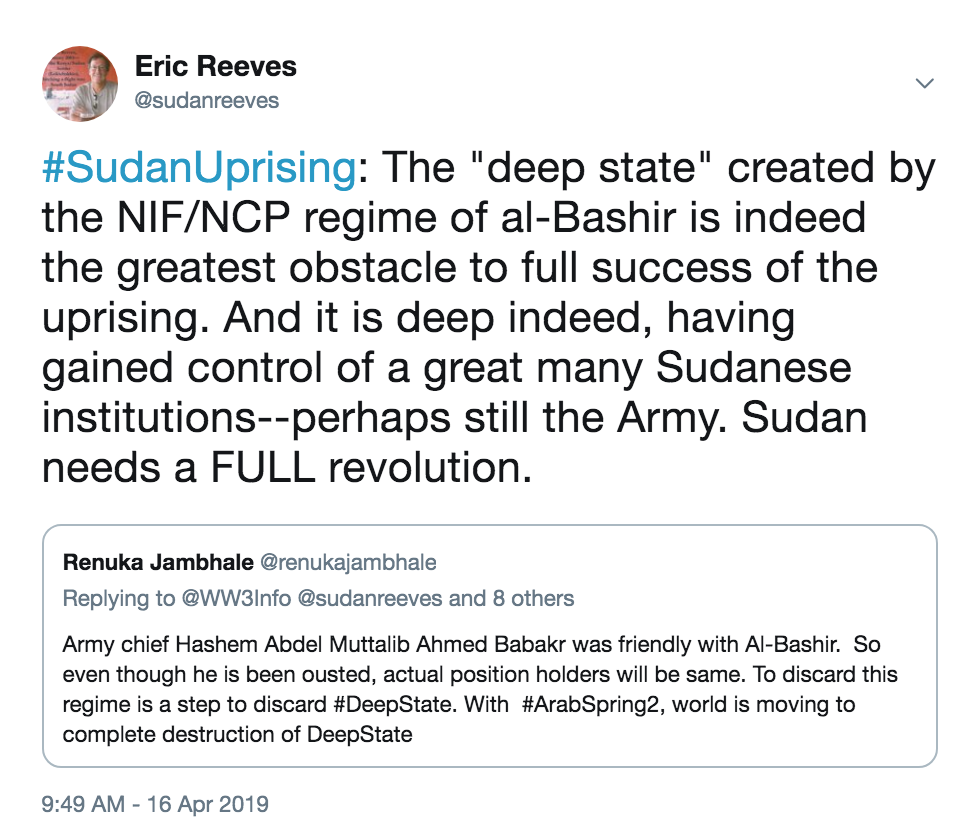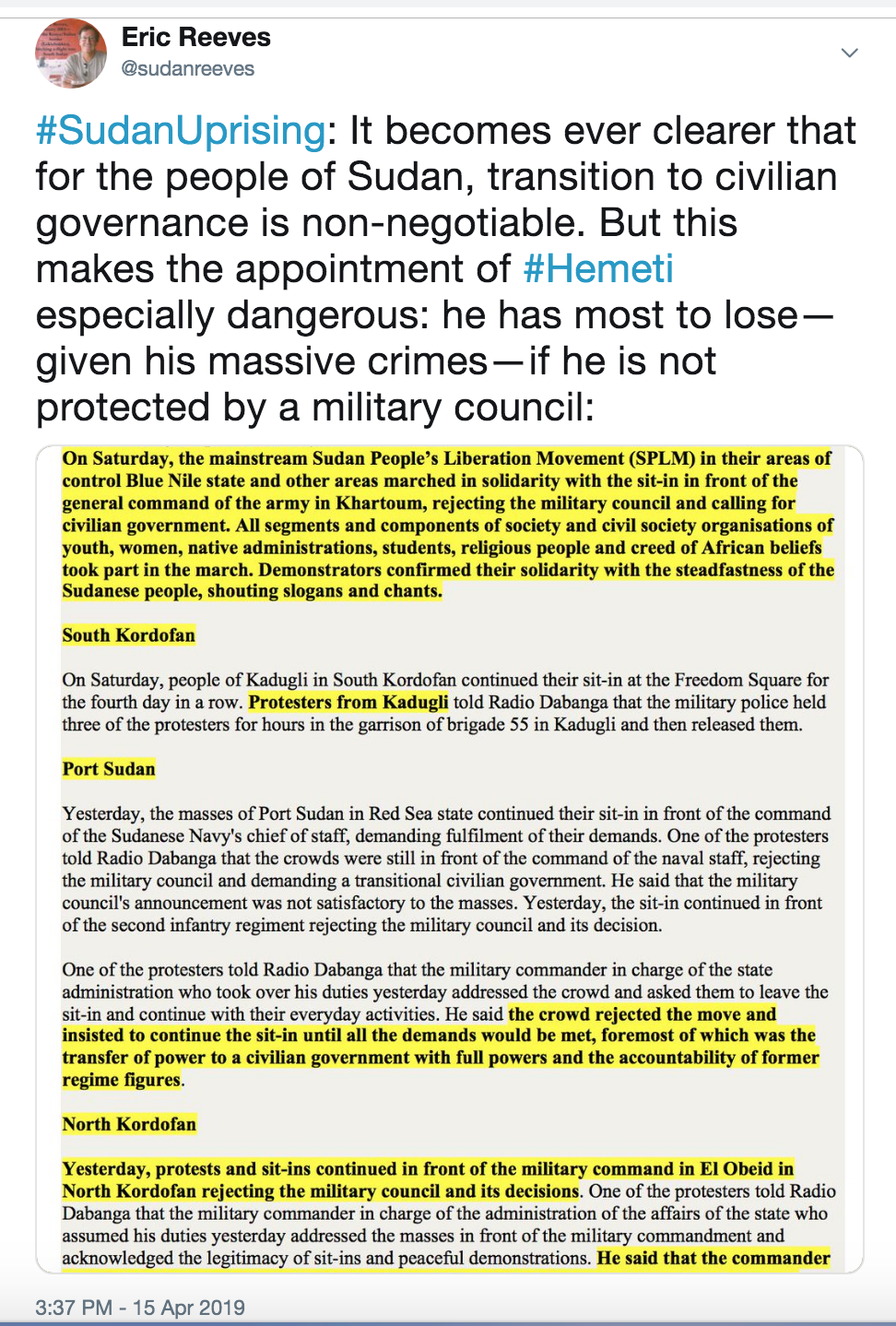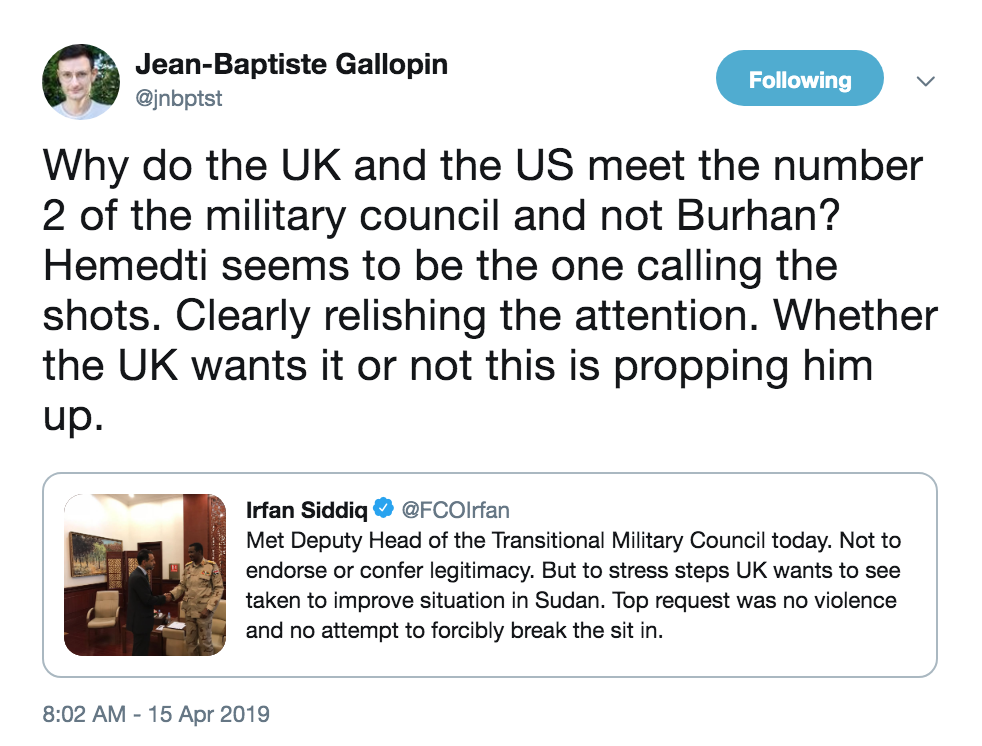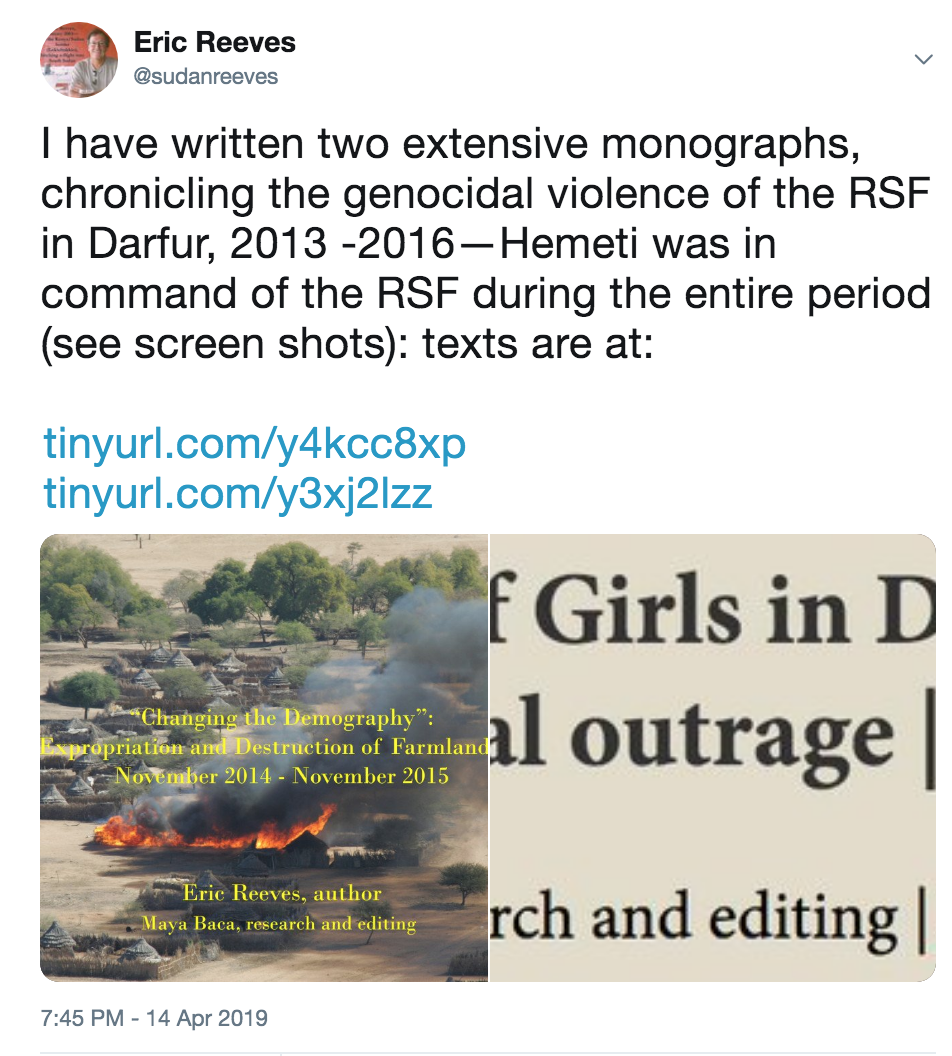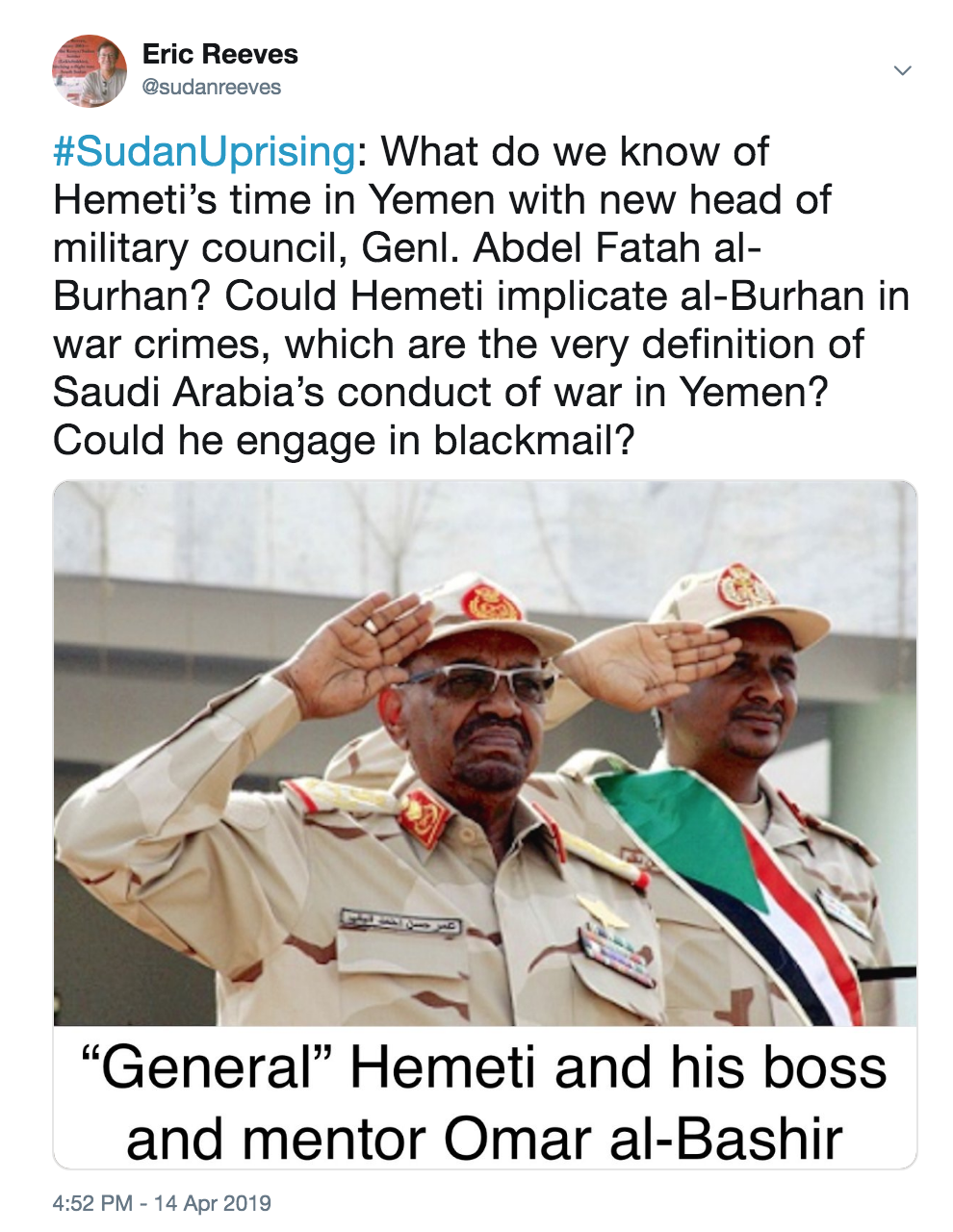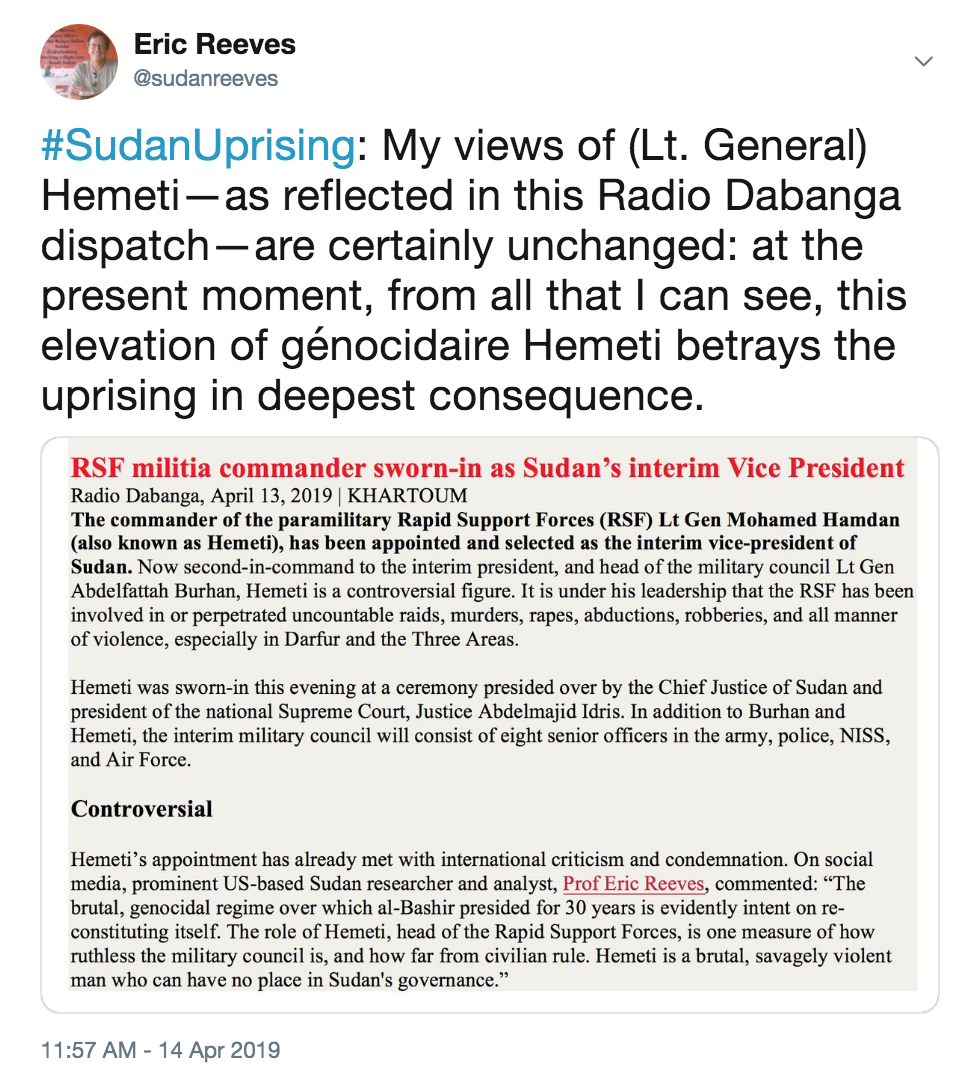Grim Realities Confront Sudan’s Uprising
Eric Reeves | April 16, 2019 | https://wp.me/p45rOG-2p0
The magnificent people’s uprising in Sudan, reflecting the very best of the people in Sudan—and their yearnings as well—is now daily in greater danger. I believe that danger lies most conspicuously in the fact that Vice-President of the ruling “Military Council” is Lt. General Mohamed Hamdan Dagolo, more commonly known as Hemeti. I must emphasize that Hemeti likely has more blood on his hands than any Sudanese officer in either the Sudan Armed Forces (SAF) or his own Rapid Support Forces (RSF), the militia that superseded the notorious “Janjaweed” in Darfur.
Notably, the RSF has been much more substantially armed and equipped than the “Janjaweed,” and the al-Bashir regime openly embraced the RSF. And although it was and is nominally part of the regular Army, the RSF does not have a place in the SAF chain of command; this effectively confers upon Hemeti, as head of the RSF, the power of a private army, although one supported by many in the Army (although far from all, especially among the SAF’s middle ranks).
Hemeti is a product of what knowledgeable Sudanese continually refer to as the “deep state”—the creation of thirty years of absolute power by the al-Bashir regime, with its total control of the army, the security services, and all significant Sudanese business, whether construction, banking, or other fields. This “deep state” seems threatened, but the arrest of President al-Bashir and the forced resignation of (briefly) President Ibn Auf have not marked its end. And the primary purpose of the Military Council—insofar as we can judge it by the choice of Hemeti as Vice President—is to maintain the “deep state” as comprehensively as possible. The Military Council, if it survives, will permit some semblance of civilian rule, but only until international pressure and scrutiny abates.
If the world forgoes all that is represented in the current uprising, if it fails to compel a move to true civilian governance, then the resilient Military Council will be able quickly to snap back any concessions to civilian governance that it might have been expedient to grant.
I have focused on Hemeti in particular—in these paragraphs and in my Tweets of the past two days (they are below, in chronological order—because in the words of one the finest analysts of Sudan I know,
Hemeti has really become the master of the game; he is the one who imposed his friend al-[General Abdel Fattah al-]Burhan to the Military Council [which al-Burhan now heads]. Behind Hemeti are older and more educated Darfur Arab military and political leaders; they were active, with a pro-Arab agenda, even before the war in Darfur; they are the real creators of the janjaweed. The scenario [these political and military leaders] envisage is that of a pro-Arab military regime, although not Islamist. They believe this is acceptable to Saudi Arabia, the EAU—and perhaps the U.S. (lightly edited for clarity—ER).
The Military Council very deliberately had the British, Dutch, European Union, and American officials meet not with General Abdel Fattah al-Burhan, the Council’s President, but Hemeti. One should think of this as a test of how much the Council has to fear from concerted and united international action against the Military Council, including possibly closings of embassies, working to remove Sudan from the UN and UN bodies, imposition of stiff financial sanctions, and halting what is now the rapid outflow of hard currency from Sudan to safe havens abroad. Judging by the jovial smiles of U.S. Charge d’affaires Koutsis, British Ambassador Siddiq, Dutch Ambassador Boven, and EU Ambassador Dumond, Hemeti must feel well satisfied. Every such smile, every such diplomatic greeting emboldens Hemeti, gives legitimacy to his position on the Military Council—and thus ultimately makes the likelihood a civilian governance commensurately less.
I must stress again and again who Hemeti is: he is a génocidaire of the first order. His RSF troops wrought incredible destruction and suffering upon the people of Darfur from 2013 – 2016 and continue to this day. The evidence of his culpability—in the destruction of many, many hundreds of non-Arab villages, the killing of many, many thousands of innocent civilians and the rape of even more girls and women, along with the violent expropriation of non-Arab farmland—is simply overwhelming:
“Scorched Earth, Poisoned Air: Sudanese Government Forces Ravage Jebel Marra, Darfur,” Amnesty International, September 26, 2016 | https://www.amnestyusa.org/reports/scorched-earth-poisoned-air-sudanese-government-forces-ravage-jebel-marra-darfur
“Men With No Mercy”: Rapid Support Forces Attacks Against Civilians in Darfur, Sudan,” Human Rights Watch, September 9, 2015 | https://www.hrw.org/report/2015/09/09/men-no-mercy/rapid-support-forces-attacks-against-civilians-darfur-sudan
“‘Changing the Demography”: Violent Expropriation and Destruction of Farmlands in Darfur, November 2014 – November 2015” | December 2015—includes framing analysis, extensive data spreadsheet covering all reported incidents of violence against farmers and farmland in Darfur, as well as a detailed mapping of these data onto three maps encompassing all of Darfur (monograph translated into Arabic) | http://wp.me/p45rOG-1P4
“Continuing Mass Rape of Girls in Darfur: The most heinous crime generates no international outrage” | January 2016 | Eric Reeves, author | Maya Baca, research and editing—includes framing analysis, extensive data spreadsheet for 2014 and 2015, as well as detailed mapping of these data onto three maps encompassing all of Darfur (monograph translated into Arabic | http://wp.me/p45rOG-1QG )
My observations on the failure of the world to see the implications of Hemeti’s position on the Military Council are reflected in the Tweets below (my Twitter “handle” is @SudanReeves). They are the most recent of the hundreds of Tweets I have posted since December 19, 2018 (in reverse chronological order):
(Not by me but by Professor Gallopin)

